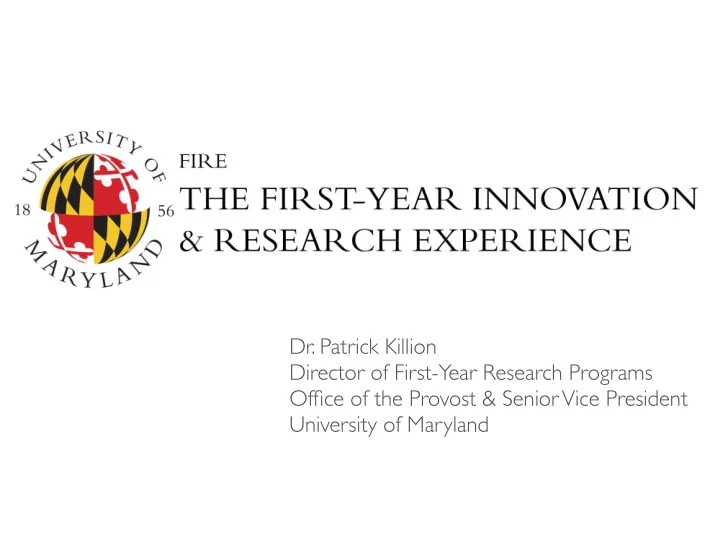

Dr. Patrick Killion Director of First-Year Research Programs Office of the Provost & Senior Vice President University of Maryland
FIRST-YEAR CHALLENGES One Approach to Provide First-Year Students: • Authentic Faculty & Institutional Connections • Profession-Relevant Experiences • Meaningful Social Networks • More than Organizations & Student Affairs • Relationships with Successful Upper Division Students • Broad Mentorship (personal, academic & research)
UMD, Office of Institutional Research, Planning & Assessment (IRPA)
UMD, Office of Institutional Research, Planning & Assessment (IRPA)
UMD, Office of Institutional Research, Planning & Assessment (IRPA)
UMD, Office of Institutional Research, Planning & Assessment (IRPA)
Office of Institutional Research, Planning & Assessment (IRPA)
FIRST-YEAR POPULATIONS & CHALLENGES 30% 35% Honors & College Park Scholars FYF Non-Honors & College Park Scholars FYF Transfer 35% • Support Underserved First-Year & Transfer Students Affect Experience, Retention, Success & Time To Graduation • Assist Undeclared Students in Major Discovery • Further Integrate Research & Education Missions: Tear Down the Wall * approximated annual new students
based on FIRE expands the FRI model: • FYF & Transfer Students • STEM + Beyond-STEM • Innovation & Research Focus • Regional Partnerships (NIH, NCI)
Program Information •Started in 2005. •> 800 freshmen per year. •> 40% from underrepresented groups. •> 70% still researching at the end of third year. •Publication in review. Assessment Outcomes •Higher GPAs & Retention •Greater Success in First Year Courses
FIRE MISSION STATEMENT FIRE provides first-year students research experience, broad mentorship and social connectivity that impacts academic success and professional development.
FIRE STREAMS dedicated mentorship CRLA IMTPC
FIRE PROGRAM FLOW General Education Course Credit
HIGH IMPACT PRACTICES Employed: • First-Year Seminars & Experiences • Learning Communities • Writing-Intensive Courses • Collaborative Assignments & Projects • Undergraduate Research Enabled: • Global Research • Service Learning & Community-Based Learning • Internships, Capstone Courses & Projects High-Impact Educational Practices: What They Are, Who Has Access to Them, and Why They Matter George D. Kuh (AAC&U, 2008)
T-SHAPED PROFESSIONALS T-Summit, 2014-15 http://tsummit2014.org/t
IMPLEMENTATION DETAILS •Open (RFP) vs. Closed •2014/15: Launching 8 Research Streams: Supporting ~8 Research Educators Supporting 32+ Peer Mentors Serving 225+ First-Year Students •2015/16 RFP In-Progress
Faculty Leader: Dr. Brooke Liu Research Institute Affiliation: National Consortium for the Study of Terrorism and Responses to Terrorism (START) Faculty Leaders: Dr. Carl Lejuez., Dr. Laura MacPherson, Dr. Richard Yi Research Institute Affiliation: Center for Addictions, Personality, and Emotion Research (CAPER)
Faculty Leader: Dr. Daniel Stein Faculty Leader: Dr. Jon Dinman Faculty Leaders: Dr. Mihai Pop Dr. Michael Cummings Dr. Steve Mount Dr. Sridhar Hannenhalli
Faculty Leaders: Dr. Lars J. Olson, Dr. Anna Alberini, Dr. Sebastien Houde Faculty Leaders: Dr. Charles Delwiche Dr. Najib El-Sayed Dr. Sally Horner (Anne Arundel Community College)
Faculty Leader: Dr. Bernard Cooperman Though typically waged at a physical and cognitive distance, modern warfare is an intimate part of our national experience and identity. Using World War I as our laboratory case, students will undertake projects that help to trace the often hidden lines between distant violence and the basic structures and attitudes that define our society. Students will draw on a broad variety of primary sources available in the Washington DC area— libraries, newspapers, archives, museums, research centers—to trace important ways that war affects life in this area and the nation.
ASSESSMENT STRATEGY
IMPLEMENTATION: SERVING CONSTITUENCIES Curricular & Instructional: • Reformed General Education Program Flexible Curricular Alignment • Academic Unit First-Year Reforms Curriculum Sharing • Peer Mentoring Initiatives Support & Institutionalization
IMPLEMENTATION: SERVING CONSTITUENCIES Institutional: • University Career Center Accelerated Career Relevance, Professional Development, Opportunity • Graduate School Professional Development Incubator • Academy for Innovation & Entrepreneurship Support Innovation-based Activities • International Affairs Enable Career-Relevant International Experiences • Teaching & Learning Transformation Center (TLTC) Demonstrative Venue for Advanced/Active/Inquiry Learning Broad Utilization of Peer Mentorship
TRANSFERABILITY Coordinating with Existing Programs & Initiatives: • Serving Campus Constituencies • Building Consensus of Mission • FRI Multisite Sustainability: • Primary Research Grants with Faculty • Industry & Community Partners • Course Replacement & Retention Value Research Simply the Vector: • Challenge, Growth, Mentorship, Community & Leadership
web http://fire.umd.edu/ twitter @umdfire
Recommend
More recommend